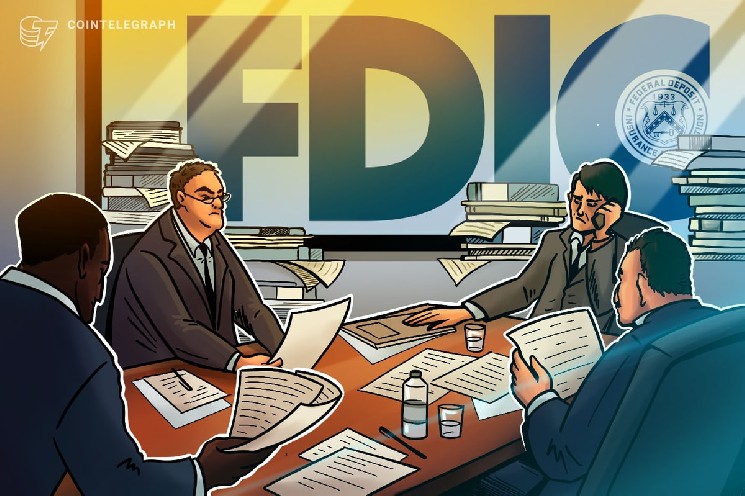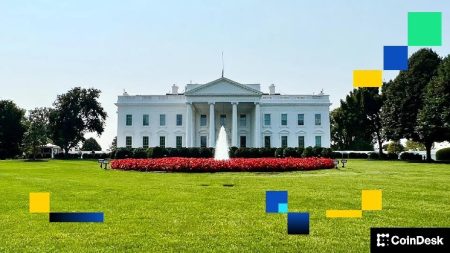Trump Nominates Travis Hill as FDIC Chair, Signaling Potential Shift in Crypto Banking Policies
Trump Advances Hill as FDIC Chair Nominee Amid Changing Regulatory Landscape
In a significant move that could reshape the regulatory environment for digital assets and financial institutions, President Donald Trump has formally submitted the nomination of Travis Hill to serve as chair of the Federal Deposit Insurance Corporation (FDIC) for a five-year term. Hill, who currently serves as acting chair of the agency, has previously demonstrated a more accommodating stance toward cryptocurrency and blockchain technology than his predecessors, potentially signaling a shift in how traditional banking institutions might engage with digital assets in the coming years.
Congressional records confirmed that Hill’s nomination was officially transmitted to the Senate Banking Committee on Tuesday, initiating what could be a lengthy confirmation process, particularly given the current government shutdown. The nomination comes at a critical juncture for the financial regulatory landscape, as the cryptocurrency industry continues to seek clearer guidelines and more consistent regulatory approaches from federal agencies. Hill would replace Martin Gruenberg, who resigned in January following the transition from the Biden administration.
Hill’s nomination is particularly noteworthy for stakeholders in the digital asset space, as he has previously advocated for increased regulatory clarity regarding cryptocurrencies and tokenization. Before assuming his current role at the FDIC, Hill publicly addressed the need for additional guidance on digital assets and pushed back against allegations that U.S. authorities were systematically “debanking” companies with cryptocurrency connections. His proactive approach materialized in March when he issued a clarifying letter to financial institutions, explicitly stating that banks could engage with digital assets as a “permissible activity” under existing regulatory frameworks.
Hill’s Vision for Banking and Blockchain Integration
“I expect this to be one of several steps the FDIC will take to lay out a new approach for how banks can engage in crypto- and blockchain-related activities in accordance with safety and soundness standards,” Hill stated in March, underscoring his intention to develop a more comprehensive framework for traditional financial institutions to participate in the evolving digital asset ecosystem. This approach represents a potential departure from the more cautious stance adopted by many regulatory bodies during the previous administration.
Hill’s perspective appears to focus on establishing clear parameters that would allow banks to innovate with blockchain technologies while maintaining robust safety and soundness standards. This balanced approach could potentially bridge the gap between traditional financial services and emerging digital asset platforms, creating new opportunities for institutional participation in cryptocurrency markets while addressing legitimate regulatory concerns.
The potential confirmation of Hill as FDIC chair comes amid broader changes in the regulatory landscape under the Trump administration. While Trump has announced several nominations that could significantly impact U.S. cryptocurrency policy, including Hill, there remain notable vacancies at other key financial regulatory agencies. The president has yet to name a replacement for prospective Commodity Futures Trading Commission (CFTC) chair Brian Quintenz or other commissioners to complete the agency’s five-seat leadership panel. Similarly, a Democratic commissioner’s seat at the Securities and Exchange Commission (SEC) has remained vacant since January, leaving important positions unfilled at agencies that play crucial roles in cryptocurrency oversight.
Regulatory Vacancies and Government Shutdown Complicate Confirmation Timeline
The timing of Hill’s confirmation hearings remains uncertain, particularly given the ongoing government shutdown resulting from Congress’s failure to pass a funding bill this week. As of publication, Democratic and Republican lawmakers had not reached an agreement to end the shutdown, which many analysts expect to continue until at least next week. This political impasse could delay the Senate Banking Committee’s consideration of Hill’s nomination, potentially extending the period during which the FDIC operates under acting leadership.
The shutdown adds another layer of complexity to an already intricate regulatory environment for financial institutions and cryptocurrency companies. While the FDIC does not receive appropriations from Congress and can continue to function during the shutdown, the broader political standstill could impede progress on regulatory initiatives and policy development. This situation underscores the challenges facing the financial sector as it navigates changing leadership at key regulatory agencies amid political uncertainty.
Looking beyond the immediate confirmation process, Hill’s potential leadership at the FDIC could represent a meaningful shift in how the agency approaches innovation in the financial sector. His previous statements suggest an openness to exploring how traditional banking institutions can safely engage with digital assets and blockchain technology, potentially creating pathways for increased integration between conventional finance and cryptocurrency markets. This approach aligns with broader trends in the financial industry, where many institutions are seeking to develop capabilities in digital assets while managing regulatory risk.
Implications for the Future of Banking and Digital Assets
The FDIC’s approach to cryptocurrency under Hill’s leadership could have far-reaching implications for both traditional banks and digital asset firms. By providing clearer guidance and establishing appropriate frameworks for bank engagement with digital assets, the FDIC could help reduce regulatory uncertainty that has historically limited institutional participation in cryptocurrency markets. This clarity could potentially accelerate adoption of blockchain technologies within the traditional financial system while establishing appropriate guardrails to protect consumers and maintain financial stability.
Moreover, Hill’s nomination reflects the growing recognition that digital assets and blockchain technology are becoming increasingly integrated into the broader financial ecosystem. As these technologies continue to mature, regulatory approaches that acknowledge their potential benefits while addressing legitimate risks will be essential for fostering innovation while protecting consumers and maintaining financial stability. Hill’s previous statements suggest he may seek to strike this balance by developing frameworks that enable responsible innovation rather than imposing blanket restrictions.
As the confirmation process unfolds, stakeholders across the financial industry will be closely monitoring Hill’s statements and policy positions for indications of how the FDIC might approach digital asset regulation under his leadership. While the immediate impact of his nomination may be limited by political circumstances, the long-term implications for the relationship between traditional banking and cryptocurrency could be substantial. For an industry that has frequently cited regulatory uncertainty as a significant obstacle to growth and innovation, the prospect of clearer guidance from a major financial regulator represents a potentially significant development in the evolving landscape of digital asset regulation.















